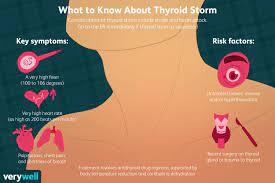Thyroid Storm
Thyroid storm is a rare and potentially fatal condition that can occur in hyperthyroid patients. A high fever and a rapid heart rate are common symptoms. Thyroid storm is a medical emergency that requires hospitalization
Who is affected by a thyroid storm?.
Thyroid storm is a complication of hyperthyroidism, so people with hyperthyroidism-causing conditions, such as Graves’ disease or a toxic thyroid adenoma, are more likely to develop thyroid storm. Thyroid storms are more common in women and people assigned female at birth than in men or people assigned male at birth, as with all thyroid disorders. Thyroid storms affect people between the ages of 42 and 43.
Is thyroid storm common?
Thyroid storms are uncommon. Thyroid storm affects approximately 5 to 7 people per million people in the India.
How does a thyroid storm feel?
How does a thyroid storm feel?

Because thyroid hormone affects so many different parts of your body, if you have a thyroid storm, you’ll probably feel pretty lousy all over. You may experience:
- It was extremely hot and sweaty.
- It’s as if your heart is about to beat out of your chest.
- Extremely agitated or anxious.
- Shaky.
- You’re sick to your stomach.
- It’s as if you don’t have control over your body.
- Confused.
If you are experiencing any of these symptoms, you must get to the nearest hospital as soon as possible.
What are the symptoms of a thyroid storm?
Thyroid storm is characterised by the following signs and symptoms:
- A high fever is common, with temperatures ranging from 104 to 106 degrees Fahrenheit.
- Tachycardia is characterised by a rapid heart rate that can exceed 140 beats per minute.
- Being agitated, irritable, or anxious.
- Delirium.
- Heart failure caused by congestive heart failure.
- Consciousness loss.
Thyroid storm symptoms that are less common include:
- Nausea and/or vomiting that is severe.
- Diarrhea.
- Pain in the abdomen.
- Yellowing of the skin or eyes (jaundice).
How is thyroid storm treated?
Because thyroid storm is a medical emergency, you must be treated in a hospital. If you have any of these symptoms, go to the nearest hospital as soon as possible.
Thyroid storm treatment can be divided into four broad categories, which are as follows:
- Treatment aimed at reducing thyroid hormone production and release.
- Treating your body’s systems and tissues affected by excess thyroid hormone, such as your heart.
- Treatment of the underlying cause of your thyroid storm.
- Other treatments that can help with symptoms and side effects.
Thyroid storm medications and treatments may include:
- Thionamides are antithyroid medications that prevent your thyroid from producing new thyroid hormones.
- Iodine solution is used to prevent your thyroid from producing thyroid hormone.
- Beta-blockers can help you manage your symptoms.
- To prevent your gut from reabsorbing thyroid hormone, use bile acid sequestrants.
- Acetaminophen and cooling blankets can help you cool down.
- Supplemental oxygen is a type of respiratory treatment.
If you have thyroid storm, you will most likely be admitted to the hospital’s intensive care unit (ICU) so that your healthcare team can closely monitor your symptoms and condition.
How soon will I feel better after thyroid storm treatment?

You should feel better within 24 hours if you receive proper medical treatment. It could take up to a week to treat the underlying cause of your thyroid storm.
What are the side effects of a thyroid storm?
Thyroid storm can cause serious complications if treated late or not at all, including:
- Failure of the heart.
- Clots form in the blood.
- Seizures.
- Delirium.
- Coma.


